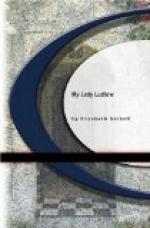Mr. Horner all this time was suffering as much as any one. He was too faithful a servant of the great Hanbury family, though now the family had dwindled down to a fragile old lady, not to mourn acutely over its probable extinction. He had, besides, a deeper sympathy and reverence with, and for, my lady, in all things, than probably he ever cared to show, for his manners were always measured and cold. He suffered from sorrow. He also suffered from wrong. My lord’s executors kept writing to him continually. My lady refused to listen to mere business, saying she intrusted all to him. But the “all” was more complicated than I ever thoroughly understood. As far as I comprehended the case, it was something of this kind:—There had been a mortgage raised on my lady’s property of Hanbury, to enable my lord, her husband, to spend money in cultivating his Scotch estates, after some new fashion that required capital. As long as my lord, her son, lived, who was to succeed to both the estates after her death, this did not signify; so she had said and felt; and she had refused to take any steps to secure the repayment of capital, or even the payment of the interest of the mortgage from the possible representatives and possessors of the Scotch estates, to the possible owner of the Hanbury property; saying it ill became her to calculate on the contingency of her son’s death.
But he had died childless, unmarried. The heir of the Monkshaven property was an Edinburgh advocate, a far-away kinsman of my lord’s: the Hanbury property, at my lady’s death, would go to the descendants of a third son of the Squire Hanbury in the days of Queen Anne.
This complication of affairs was most grievous to Mr. Horner. He had always been opposed to the mortgage; had hated the payment of the interest, as obliging my lady to practise certain economies which, though she took care to make them as personal as possible, he disliked as derogatory to the family. Poor Mr. Horner! He was so cold and hard in his manner, so curt and decisive in his speech, that I don’t think we any of us did him justice. Miss Galindo was almost the first, at this time, to speak a kind word of him, or to take thought of him at all, any farther than to get out of his way when we saw him approaching.
“I don’t think Mr. Horner is well,” she said one day; about three weeks after we had heard of my lord’s death. “He sits resting his head on his hand, and hardly hears me when I speak to him.”
But I thought no more of it, as Miss Galindo did not name it again. My lady came amongst us once more. From elderly she had become old; a little, frail, old lady, in heavy black drapery, never speaking about nor alluding to her great sorrow; quieter, gentler, paler than ever before; and her eyes dim with much weeping, never witnessed by mortal.
She had seen Mr. Gray at the expiration of the month of deep retirement. But I do not think that even to him she had said one word of her own particular individual sorrow. All mention of it seemed buried deep for evermore. One day, Mr. Horner sent word that he was too much indisposed to attend to his usual business at the Hall; but he wrote down some directions and requests to Miss Galindo, saying that he would be at his office early the next morning. The next morning he was dead.




